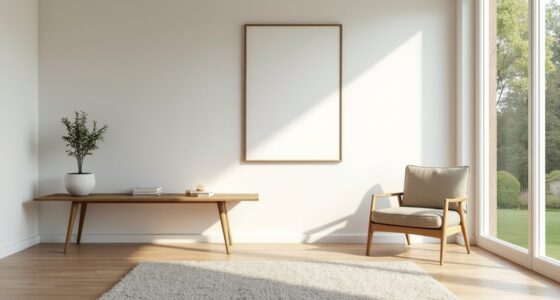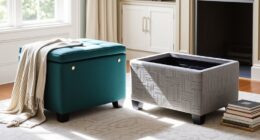Minimalists don't need big houses because they prioritize meaningful experiences over material possessions. Embracing intentional living, they focus on quality rather than quantity, appreciating each item they own. Smaller spaces reduce clutter and stress, fostering a more mindful lifestyle where genuine connections thrive. Lower costs also free up resources for enriching experiences and community engagement. By simplifying life, you find freedom and clarity, unlocking the true essence of living fully. There's much more to explore about this philosophy.
Key Takeaways
- Minimalists prioritize quality over quantity, valuing experiences and meaningful possessions over the need for expansive living spaces.
- Smaller homes reduce financial burdens, allowing minimalists to allocate resources towards experiences rather than material goods.
- Compact living spaces foster mindfulness and appreciation for possessions, enhancing connection to what truly matters in life.
- Minimalism encourages decluttering, creating a serene environment that promotes productivity and reduces stress.
- Efficient design in smaller homes maximizes functionality, allowing for comfort without excessive space or clutter.
The Philosophy of Minimalism

While many people chase after material possessions, the philosophy of minimalism encourages you to focus on what truly matters in life. It starts with awareness—recognizing how advertising influences your decisions. Awareness fosters a deeper connection to the present moment, allowing you to make more intentional choices in your pursuit of minimalism. Embracing effortlessness means simplifying daily routines to reduce stress. By ceasing the relentless pursuit of material goods, you prioritize what genuinely adds value to your life. For instance, the design of Builder Mikes Bright Tiny House effectively showcases how innovative living can maximize space while promoting sustainability.
Minimalism also promotes flexibility, adapting its principles to fit your unique lifestyle. Intentional living is key; every choice should reflect your core values and enhance meaningful relationships. You'll find joy in quality over quantity, and in nurturing connections rather than accumulating things. Ultimately, minimalism isn't just about living with less; it's about creating a life filled with purpose and fulfillment.
Benefits of Living in Smaller Spaces
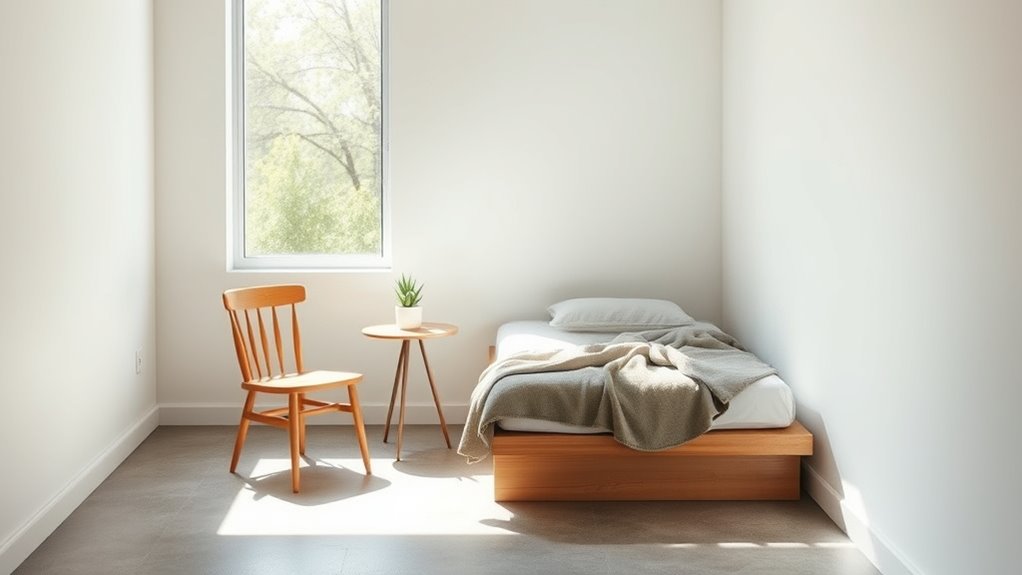
Living in smaller spaces can significantly enhance your quality of life, offering a range of benefits that go beyond mere aesthetics. You'll enjoy lower mortgage payments and reduced utility bills, easing financial stress and allowing for more savings. With fewer expenses, managing your finances becomes straightforward, and you can invest in what truly matters. Additionally, living in a smaller home often leads to a greater appreciation for what you have, encouraging mindfulness about material possessions. Implementing vertical storage solutions can help maximize your living space even further. Environmentally, smaller homes have a smaller ecological footprint, promoting energy efficiency and sustainable living. Socially, these spaces foster closer relationships and community engagement, leading to shared experiences and quality time with loved ones. Mentally, less clutter reduces stress and anxiety while improving clarity and productivity. Ultimately, smaller living spaces provide flexibility, more free time, and financial freedom to pursue your passions.
Intentional Consumption and Reduced Waste
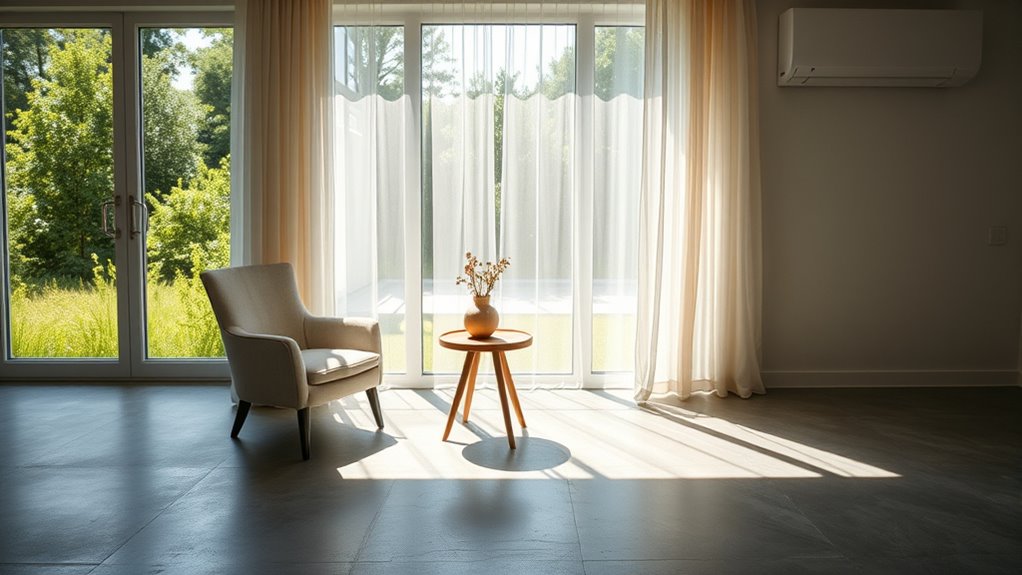
By embracing intentional consumption, you can significantly reduce waste and contribute to a more sustainable lifestyle.
Focus on quality over quantity; invest in durable, repairable products that last longer. When shopping, make mindful purchasing decisions to minimize your carbon footprint. Opt for items with minimal or recyclable packaging, and consider bulk buying to further cut down on waste. Adopting practices that minimize ecological footprint encourages a more sustainable way of living. Additionally, practicing eco-friendly minimalism helps streamline your consumption habits while supporting environmental health.
Engage with your community to share resources and knowledge, fostering collective efforts in waste reduction. By simplifying your home and prioritizing necessities, you'll reduce stress and environmental impact.
Simplified Living and Efficiency

By decluttering your space, you unlock more usable areas, allowing you to focus on what truly matters. With fewer possessions, you spend less time maintaining and cleaning, freeing up precious hours for meaningful activities. This greater sense of control over your environment promotes a feeling of accomplishment and progress, reinforcing positive habits. Additionally, embracing holistic living can enhance your overall well-being, as it encourages a deeper connection to your home and heritage.
Financially, you'll notice savings as you avoid unnecessary purchases, reducing stress and promoting a calm environment. Simplifying encourages mindfulness, helping you live in the present and appreciate your surroundings. This lifestyle shift fosters greater productivity, creativity, and self-awareness, leading to more restful living spaces.
Avoiding unnecessary purchases brings financial savings, diminishes stress, and cultivates a serene atmosphere.
Ultimately, simplified living aligns your actions with your values, paving the way for intentional decision-making and authentic personal growth.
Design Elements of Minimalist Homes
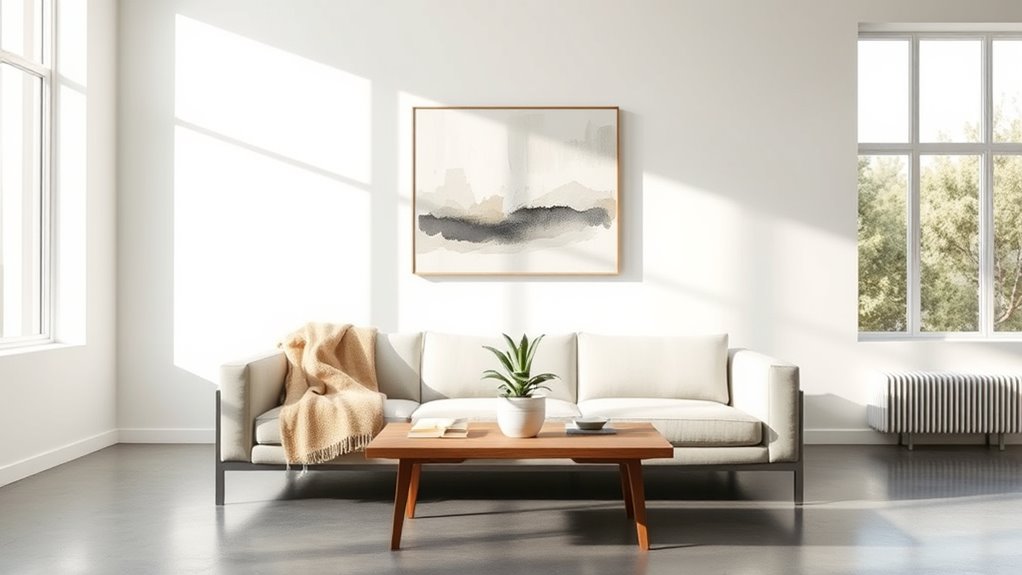
When designing a minimalist home, it's essential to focus on creating a harmonious space that embodies simplicity and functionality.
Start with a neutral color scheme—whites, grays, and blacks create a calm atmosphere, while soft natural shades add warmth. Incorporating smart shopping tips for furnishings can further enhance your minimalist aesthetic while staying within budget.
Opt for streamlined furniture with clean lines and minimal ornamentation, ensuring each piece serves a purpose. Streamlined furniture is a hallmark of minimalist design, emphasizing both aesthetics and utility.
Incorporate natural materials like wood and stone for texture, fostering a connection to nature.
Maximize natural light with large windows and open floor plans, placing furniture strategically to enhance brightness.
Finally, prioritize efficient storage solutions, using built-in cabinets and hidden shelves to keep your space clutter-free.
Psychological Benefits of Minimalism
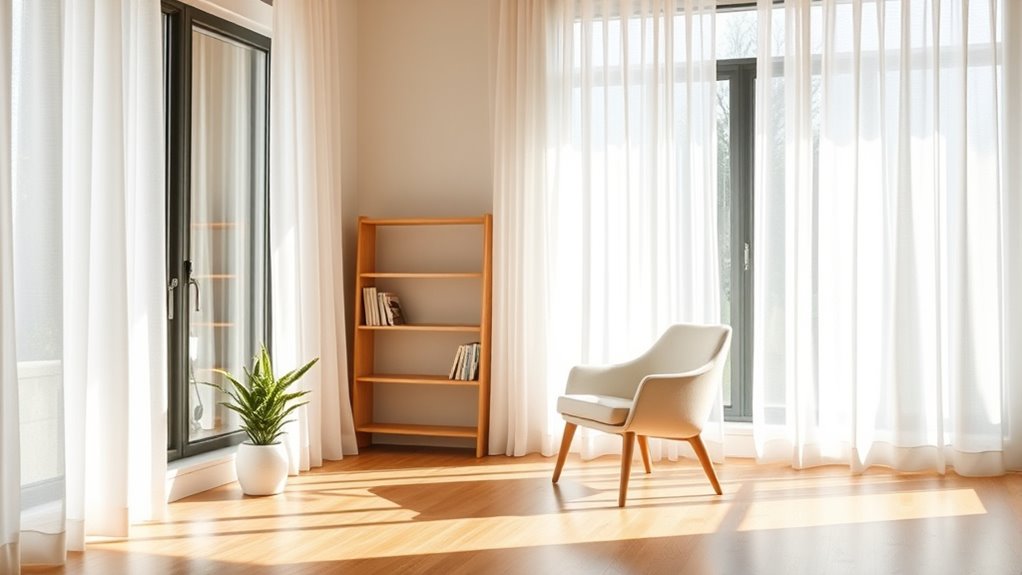
Although many people associate minimalism with physical space, its psychological benefits can profoundly impact your mental well-being. By reducing mental clutter, you'll experience improved focus and clarity, allowing your actions to align more closely with your values. This practice of psychological minimalism not only enhances your ability to prioritize but also helps in reducing stress and anxiety through simplification. With less time spent managing possessions, you can boost your productivity and make more intentional decisions. Minimalist living often leads to lower stress levels and better physical health, enhancing your overall life satisfaction. Additionally, adopting effective relaxation techniques can complement your minimalist lifestyle by further promoting mental calmness.
You'll find that embracing minimalism fosters emotional positivity, strengthens family dynamics, and promotes a greater sense of community. Ultimately, living simply encourages mindfulness and presence, enabling you to appreciate what truly matters while unlocking your potential and enhancing your personal growth.
Flexibility and Freedom in Small Living
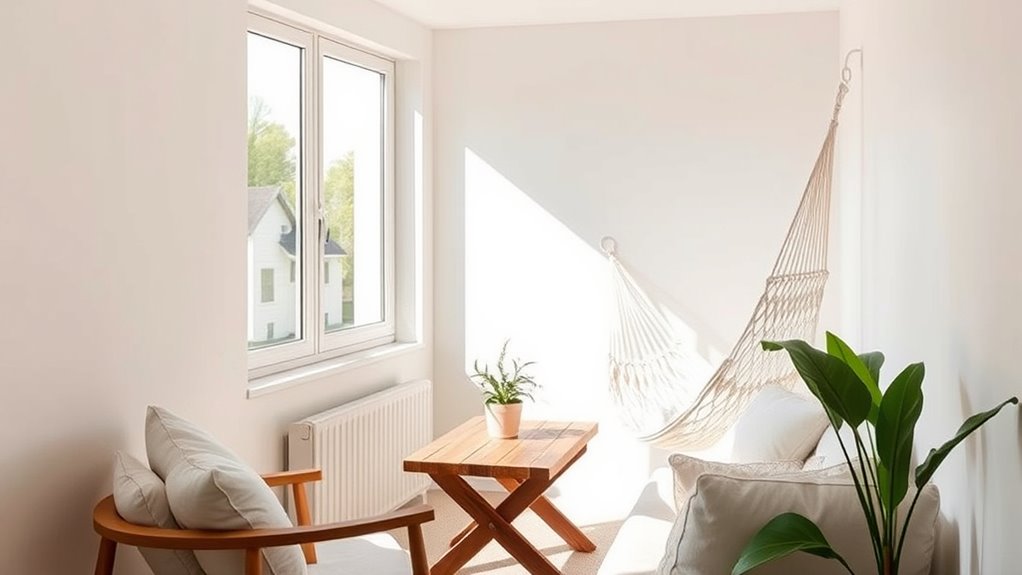
How does living in a small space offer both flexibility and freedom? In a compact environment, adaptability shines through movable furniture and modular designs, allowing you to create multifunctional areas with ease. Additionally, many tiny homes utilize multifunctional furniture to make the most of limited space.
Customizable fittings and efficient appliances enhance comfort while keeping your space organized. Financially, smaller living means reduced rent or mortgage, freeing up funds for other pursuits. Additionally, living in a small space can promote movement variety by encouraging more physical activity throughout daily tasks.
Minimalism also reduces clutter, making your surroundings feel open and inviting, which encourages movement and activity. With fewer possessions, lifestyle changes and relocations become seamless, empowering you to embrace new adventures.
Ultimately, small living fosters emotional freedom by simplifying your life and promoting sustainability, making it an appealing choice for those seeking flexibility and freedom.
Building a Supportive Minimalist Community
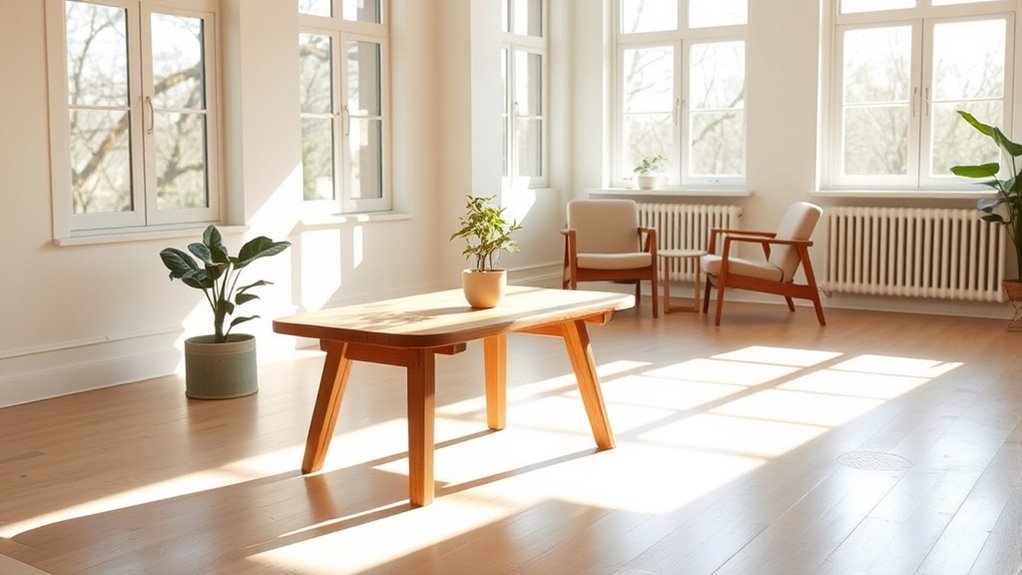
Embracing a minimalist lifestyle doesn't just transform your living space; it also opens the door to building a supportive community around shared values. You can foster belonging by encouraging user-generated content, simplifying experiences, and hosting interactive events. Engage members by empowering them to lead initiatives and recognizing their contributions with rewards. The pitfall of overcrowding can be avoided by ensuring that community offerings remain focused and intentional.
Curate content collaboratively and maintain active communication to ensure everyone feels included. Focus on core values to streamline your community's purpose, as minimalism promotes intentionality in all aspects of life. Organizing in-person meetups or virtual events can deepen connections, while feedback mechanisms help tailor experiences.
Frequently Asked Questions
How Does Minimalism Impact Relationships With Family and Friends?
Minimalism impacts your relationships by emphasizing quality over quantity.
You'll find that focusing on intentional connections allows for deeper bonds with family and friends. By reducing distractions, you can engage more meaningfully, prioritizing shared experiences.
This approach cultivates gratitude and appreciation, helping you recognize what truly matters. As you simplify life, you'll also embrace imperfections, fostering a more supportive and understanding environment in your relationships, ultimately enhancing their satisfaction and depth.
Can Minimalism Be Practiced in Large Homes?
You might think minimalism only works in small spaces, but that's not true. You can absolutely practice minimalism in large homes.
By embracing empty space and focusing on functional design, you create an elegant, stress-free environment. Choose a neutral color palette and clean lines to enhance the aesthetic.
With smart storage solutions, you can keep clutter at bay. Ultimately, minimalism is about mindset, allowing you to enjoy your space without feeling overwhelmed.
What Are Common Misconceptions About Minimalism?
You might think minimalism is all about deprivation or competition, but it's really about valuing what truly matters to you.
It's not a one-size-fits-all approach, so don't worry about fitting into a specific aesthetic. Minimalists spend purposefully, often have families, and can even drive cars.
How Do Minimalists Handle Sentimental Items?
When you're faced with sentimental items, it can feel like you're holding onto pieces of your heart.
To navigate this emotional maze, you can set up decluttering appointments, digitize photos, or create a keepsake box for truly special treasures.
Enlisting a neutral buddy for support can lighten the load, while choosing a few representative items helps preserve memories without overwhelming your space.
What Challenges Do Minimalists Face in Society?
You face several challenges as a minimalist in society. Social norms often push you towards consumerism, making it tough to stick to your values.
Friends and family might misunderstand your lifestyle, leading to feelings of isolation. Additionally, letting go of sentimental items can be emotionally taxing.
You may also find it hard to balance your minimalist ideals with the expectations of those around you, creating internal conflict in your journey.
Conclusion
In the garden of life, you don't need sprawling fields to grow. A small plot, tended with care, can bloom just as beautifully. By embracing minimalism, you cultivate intentionality, fostering a space where every item serves a purpose. As you prune away excess, you discover freedom and clarity, allowing your spirit to soar. So, nurture your little sanctuary, and watch it flourish, for in simplicity lies the richness of experience and the joy of connection.




